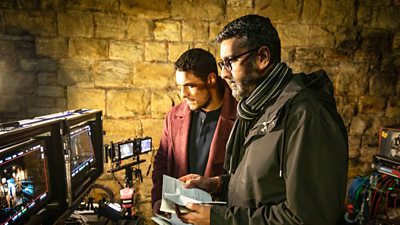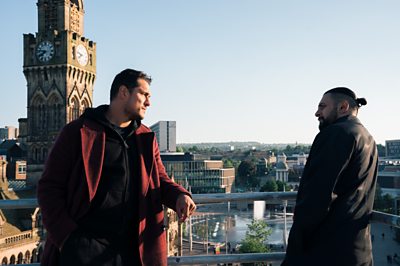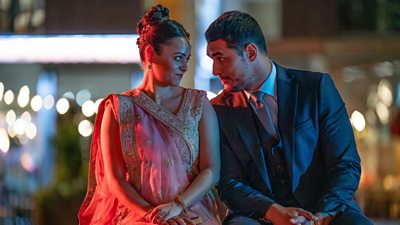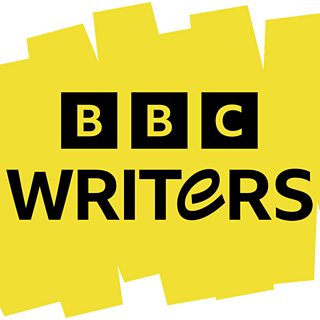Set and filmed in Bradford, Virdee tells the story of Detective Harry Virdee, a dedicated cop whose personal life is in chaos. He is in a loving relationship with his wife, Saima, but he is estranged from his family who disapprove of his interfaith marriage.
The series is based on AA Dhand's novels which he adapted for screen himself. He discusses the show, his journey into writing as well as his inspirations and advice for other writers below.
All episodes of Virdee are available to watch on BBC One and BBC iPlayer.
Can you tell us how you got started writing?
I started writing as a child because we had a video rental library in our corner shop. On Monday nights, my dad would go play snooker, and my mum would go to bed early to open the shop. I would sneak downstairs and watch the certificate 15 and 18 thrillers that I wasn't allowed to watch.
One evening, I selected "Silence of the Lambs" and had no idea what was about to happen to me. I put it on in the living room but the remote didn't work - you had to get up off the couch to turn it off. I realised quite soon that this was a very different type of movie, and I was terrified. But I daren’t get off the couch to turn it off, so I was forced to watch it. There's a scene at the end where Clarice Starling comes into Buffalo Bill's house, and there's a moth that appears on the screen and that's her clue that it's Buffalo Bill, and a fly went past my vision in the living room, and I screamed. I ran into my mother's bedroom and confessed what I'd done because there was no way that I was sleeping alone that night which takes something for a 12 or 13 year old to do!
The following morning, I got the usual telling off but that Saturday, we went to Bradford Central Library, which is something we always did and I wandered out of Children’s fiction into adult fiction and came across a book called "Silence of the Lambs." I was really confused why the movie had the same name then I realised it was based on the book. It was my first introduction to knowing that things on screen could be adapted from books.
I took the book home – I had to read it – and I didn’t finish the movie but I finished the book. Obviously, I was terrified but I couldn’t stop reading and my love affair with crime fiction was born. I started writing the following day.
Regarding the Virdee series, I started writing the books in 2006 and went on a long journey of 10 years and 1.1 million unsuccessful words until I finally got published in 2016. Then we went into development on the TV series, which took seven years and two more years to produce. So, all in all, it was a 19 year journey.
You used to be a pharmacist and decided to stop to focus on Virdee and carry on writing, what has that been like?
I’ve spent 25 years behind the counter of either a corner shop or a pharmacy. I’ve spent my whole life in customer service and retail, either looking after people or serving people. It’s been quite a change in that sense to become a full-time writer as you lose that human interaction. I’d see around 300 people a day in the pharmacy and around 200 in the corner shop, so it’s constant intel on a daily basis.
When you become a writer, it’s quiet and it’s just you and your voice. I missed the human interaction that I had, just the hi/hellos/how are yous.
On the other hand, it’s given me time to write lots more things as I’ve got more free time. I tend to write at night time so I’ve continued to do that now. The night is when the world comes alive for me as it’s quiet and its dark.
You’ve written a series of books, is the TV series an amalgamation of all of them or just one?
It’s based on my third book, City of Sinners, but I do borrow little snippets from some of the other books.
What made you finally want to adapt your books for television?
I’d written the books as a long screenplay because I’m a very visual storyteller, so I always have pictures in my head. It just felt like a very natural progression to try and adapt it myself. There wasn’t any hesitation from me to try and adapt it and I really enjoyed it because it gave me another opportunity to dissect the books but elevate it for screen, so I could go even further.

How did you find plotting an episode of TV compared to plotting a novel?
It's quite similar. I always know the ending, so I had five endings for five episodes, and then the denouement. As long as I know the ending, I've got something to aim for. For episode one, I knew the opening sequence was going to be high stakes, Bond-esque. James Bond always starts with a high action chase sequence so why don’t I do what’s really tried and tested and try to emulate and elevate that and show off Bradford with the locations. So I always know my beginning and my end and that’s all I know. The rest of it - I'm a pantser - I make it up as I go along. I wish I could tell you what the process was but I am a complete pantser so I have no idea until I start writing.
How important was Bradford to the story, and how did the city itself inform your writing process?
It absolutely did. Bradford’s a very unique city where you can have everything you want. If you want action sequences or somewhere dark and edgy, you can go to the ruined satanic mills that are decaying and nightmarish. If you want the lights, you can go to City Park with the large water fountains and the big mirror pool, or Lister Park. You have areas of outstanding beauty and areas of outstanding darkness. This allows you to mirror the emotional content of the scene with the location, which elevates the storytelling. For me, Bradford was absolutely vital. I've been here my whole life, I’m a BD4 boy done good and there was never any suggestion that I was going to write anywhere apart from Bradford.
You also worked with people from Bradford and West Yorkshire during filming, as part of the Screen Academy Bradford. How important was it to you that local people were working on the production?
It was vital. From the infancy of the show, we said that we wanted to have local people involved, to curate, develop and nurture local talent and create opportunities for them to enter this industry and see what it’s about. Bradford is one the youngest populations in England – we’ve got an enormous population that is going to be part of the future of this country.
This experience is new to me so I thought it would be great to bring other local people on the same journey. It was also an opportunity to lift the profile of the show so that, yes, we’re making a high-end show, but how can we embrace the people that this is about that are from the city of Bradford.
As well as being entertained by the series, we’ve also left a legacy in Bradford with the Screen Academy Bradford. It’s also giving people from underrepresented communities the opportunity to explore a world that they very seldom have the opportunity to do, myself being one of them.

How did you go about crafting the character of Virdee, and do you have any tips for writers who want to create a compelling protagonist?
Harry Virdee is probably an amalgamation of all the characters that influenced my writing, whether it's Bruce Willis in "Die Hard" or the emotional vulnerability of Clarice Starling, desperate to be successful. With my key shows that subconsciously influenced my characters, like "Luther," "The Wire," and "The Shield", I was aware that there hadn't been a South Asian character with that level of intensity or emotional depth.
For me, it was always about the emotional vulnerability of the character. It probably comes back to Clarice Starling because it’s her emotional drive and vulnerability that make us keep watching, and she’s so desperate to be successful that she’ll dance with Hannibal Lector and I thought to myself, well Harry Virdee’s also a man who would do anything to save his city, even if that means dancing with the devil. What happens is, when you start creating characters like that, what I’ve just described is a very layered and three-dimensional. There’s too many detective stories with a womaniser, alcoholic, broken marriage – well, what does it look like to have a character who loves his family and puts them at the centre of his universe? What kind of stability does that give him and how can I put that into jeopardy because that would ruin him. So I was layering Harry as much as I could do.
While it’s great that we open with this bravado chase and Staz Nair (Harry Virdee) who is obviously an athletic actor, but actually behind his eyes is this incredible vulnerability. For me, it’s all about that. I can’t write an explosion or murder which hasn’t been done before, but what I can do is take the audience behind the eyes of the actor and allow them to see – I call it blood on the page, Staz would probably say tears on the screen – and the minute I do that I’m winning.

Do you have any top tips for writers starting out, especially for TV?
The one-sentence snapshot I always say is: "Like what you love and love what you do." The first draft or project has to be written for yourself. You have to entertain yourself because you are the key audience in that first project. If you're writing for the market or to get a job, you're not writing for truth or yourself.
Write for yourself to start with, and if you're entertained and thrilled by what you've written, the good probability is that the audience will be as well. I'm a big fan of writing speculatively. I wrote Virdee speculatively. I wrote my other projects in development speculatively because I don't like having deadlines or contracts. What I want is freedom, and I think people should write freely and write for themselves and write what they know. Honestly, it will show on the page.
Do you have any advice for people dealing with rejection, especially at the early stages of their career?
Don't be disheartened. I got 66 literary rejections and probably 30 screen rejections. I couldn't even get a screen agent when I first started, even though I was a novelist. Fail forward is my thing. Carry it as a badge of honour.
I started to love getting rejected because it meant someone knew my name. So I thought ‘that person just rejected me, I’m going to send them another project in 12 to 16 weeks’ and they’re going to think ‘hang on, I’ve heard of this name.’ What happens is you start to build momentum through failure. I did start to enjoy the “nos” because I knew it was just one step closer to getting a “yes”.
You know, I watched a lot of motivational speeches about repetitions, like Arnold Schwarzenegger's. He became the best bodybuilder in the world by doing more repetitions than anybody else. Writing is about repetitions. Arnold Schwarzenegger didn’t get to be the best bodybuilder in the world by picking up one dumbbell. Nobody writes one script and gets a greenlight. What you do is you repeat and you repeat so the next time you write a script you get stronger, with each rejection you’re a bit stronger and through those repetitions you’re failing forward which is really succeeding.
Related Links
-
Watch Virdee on BBC One and BBC iPlayer
-
The Virdee Shadow Script Scheme Mandip Singh Dhesi shares his account of being part of this opportunity which ran alongside new BBC Drama, Virdee.

